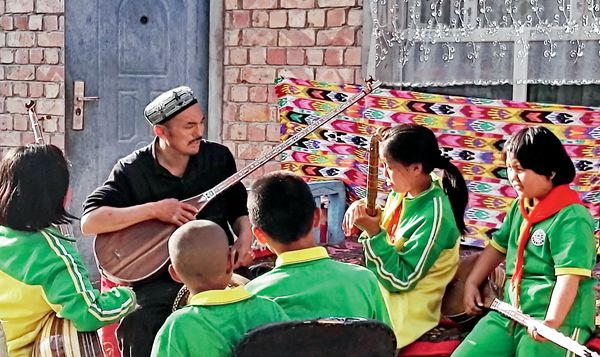Passing Down National Culture
China Today by JIAO FENG, December 23, 2016 Adjust font size:
THE clean and tidy courtyard of Alifu is typically Uygur. Flowers blossom, trees grow, and some farming tools as well as a used motorcycle lean against the wall. What makes this house different from others is a classroom, not very large, adjacent to the master room. There is a tiny blackboard on the wall, an electronic keyboard on the desk and some pieces of Uygur calligraphy by Alifu on the wall. This is where Alifu’s “interest class” takes place.
Happy Home
School ends at 7:30 pm. Then Alifu’s courtyard is enlivened. Boys and girls from nearby schools come one after another. They feel as at ease here as in their own home. Some drop their schoolbags and say they are hungry. Nuernisa, Alifu’s wife, brings them hot milk tea and naan bread that she has prepared for them. Having enjoyed this refreshment, some children start doing their homework on the desks, while others take down the dutar (a Uygur musical instrument) from the wall. Alifu begins by tuning the instrument, before teaching them fingering and how to play. Nuernisa pours milk tea, smiling. However, when it comes to the really naughty kids, she will also put on a strict face and discipline them.

Local children absorbed in Alifu’s dutar class.
This happens every day at Alifu’s house. Alifu has a roster showing the name, age, school, home address, interests, hobbies, artistic aptitude, and disposition of each child. He also adds his comments to the list. It’s all personally recorded and contains information on every child who has been here.
Twelve-year-old Zuli Huma is a fourth-grade student. She is introverted and seldom speaks in front of strangers. Last summer, her father took her to Alifu’s class. She immediately fell in love with it and spent a whole month here, doing homework, practicing the dutar, and singing and dancing with other kids. She so became more and more outgoing. She says that she loves her honorary dad Alifu and mom Nuernisa and that it’s really fun singing and dancing with her friends here.
“They’re All My Kids”
Alifu told this reporter that he started the extracurricular class because children in the village had nothing to do after school. His first thought was to help them practice Uygur calligraphy, the dutar, singing, and dancing, and to offer them a place to play that their parents could trust. To his surprise, more and more children from his own village and nearby villages, towns, and counties came to join in. Even college students came to learn ethnic musical instruments during the holidays. Seeing so many people interested in traditional Uygur culture has inspired and encouraged him.
Alifu is a farmer in Yingnuer Village, Bayingolin Mongolian Autonomous Prefecture of Xinjiang. After being laid off from a printing company in 2003, he and his wife came back to the village to take care of his mother-in-law and the 16-mu (about a hectare) cotton field.